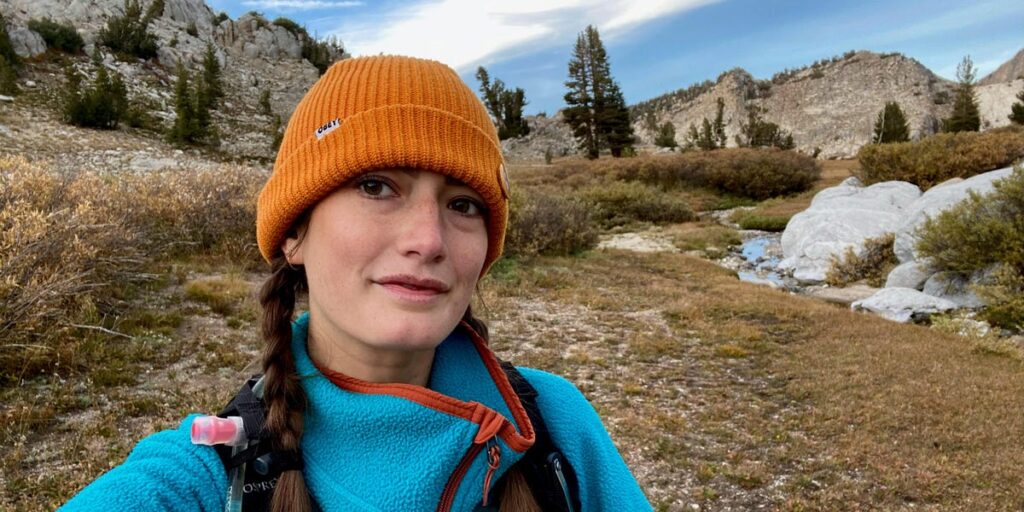- Megan Wright didn’t know what she wanted to do until she discovered seasonal work in national parks.
- Before, she was in college and thought she might be a teacher, but dropped out twice.
- Now, she says seasonal work offers varied pay and housing but lets her live in beautiful places.
This as-told-to essay is based on a conversation with Megan Wright, a 29-year-old from Texas who works seasonal jobs in or near national parks. She travels around the country with her fiancé, who also is a seasonal worker. The jobs she works are hired through contractors, not directly through the National Park Service. This story has been edited for length and clarity. Business Insider has verified her employment and pay.
I had honestly never even visited a national park before I moved to one.
I was living in Texas and was struggling to figure out my passion. I actually dropped out of college twice. The first time I was going to school to be an elementary school teacher. When I went back I was studying hospitality.
One of my friends took the advice of a friend’s father who told her, “If you’re ever lost in life, if you don’t know what to do, go scoop ice cream in Yellowstone.” She got a job in Yosemite, and when she came to visit me I had never seen her so happy.
I followed her lead, left school, and got a job in Death Valley as a restaurant host. I was 21 or 22 then. Now I’m 29. I have been doing seasonal work ever since, most often as a server at hotels or restaurants. I’ve worked at places like Zion, Glacier, Yosemite, and the Grand Canyon, and now I am back in Death Valley. I’ve been a server for the past seven years and I really love it.
I discovered my passion for the outdoors through seasonal work. I do love my job in hospitality, but to me it’s a means to be where I want to be.
Seasonal work often means moving every four to six months
I’ve worked for different companies that operate inside the parks. There are some people who stick to one company, which has its perks because you can easily transfer property to property. And then there are some people who just pick a destination and then whoever is operating there ends up becoming their employer. For the past couple years, I have stuck to transferring through the same company, Xanterra.
Most of our contracts are anywhere from four to six months. Once you start seasonal work, it’s like you get bitten by the bug. After four months, I’m itching to go somewhere new. For finding jobs, a good resource that a lot of us use is a site called CoolWorks.
Housing and pay can vary
Pay in the seasonal circuit varies pretty dramatically. Since I am a server, the majority of my wage comes from tips. Each state also has their own “server wage,” so I might make a fair hourly rate in California, and much lower somewhere like Utah. This extreme change in pay rate also has a huge influence on where I choose to work.
[Editor’s note: Wright has made anywhere from $10.30 to $16.65 per hour plus tips in some of her most recent jobs, according to employment contracts she shared with Business Insider. She noted that she makes most of her money in tips and makes more during busy seasons.]
We typically have employer-provided housing, which can vary on the quality. Some have really nice housing where you’re in basically a studio apartment with your own bathroom and kitchenette. Other places are similar to a college dorm with a shared hallway bathroom.
It’s a totally different lifestyle. There’s dorm-style living. You live with your coworkers, basically. You see each other every single day. There is no escape. That’s good and bad.
It’s incredibly easy to make friends in seasonal work. We’re all on this journey together and you have a deep understanding of one another. You make really close friendships. It feels more like a family. Everybody bands together and is supportive. We always joke that you’ve got to be a little weird to get into seasonal work.
I’ve known so many people who’ve met their partners in seasonal work. I met my fiancé at the Grand Canyon and he was also doing seasonal work. Now we move around to new places together. It’s nice to have a partner with you while you travel. Another perk is that a lot of these places offer couples housing.
There’s also a community of seasonal workers — we call ourselves “parkies” — who exchange information online about what the housing and food situation at different places is like.
I may not do seasonal work forever, but it’s great for now
There are some people who do seasonal work forever. Everybody is different. I don’t think that I will do this forever. My partner and I plan on settling down someday, but we’ll have to decide what that looks like.
Sometimes, I think, “Could I have an office job? Could I have a normal 9-to-5?” Maybe the answer is yes, but I would have to be near something that I find worthwhile.
But even just recently, my partner and I were driving into town, and as we’re driving, I’m looking around at the mountains and tearing up. I always say, “I hope this never gets old. I never want to wake up, look outside and be like, “Oh yeah, I’ve seen that.”
Read the full article here
















